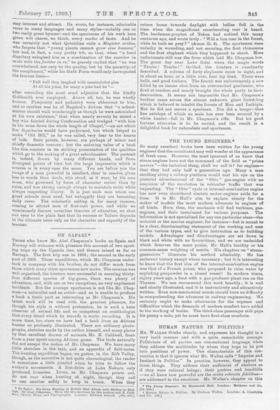ON SAFARI.*
MOSE who know Mr. Abel Chapman's books on Spain and Norway will welcome with pleasure this account of two sport- ing trips up the Uganda line, and thence inland as far as Baringo. The first trip was in 1904; the second in the early part of 1900. These expeditions, which Mr. Chapman under- took in company with his brother, do not differ much from those which many other sportsmen now make. The caravan was well organised, the hunters were successful in securing thirty- four different species of big-game, there was plenty of adventure, and, with one or two exceptions, no very unpleasant incidents. But the average sportsman is not like Mr. Chap- man—a naturalist and an artist—and so is unable to produce a book a tenth part as interesting as Mr. Chapman's. His latest work will be read with the greatest pleasure, for though his style is without pretension, he is such a keen observer of animal life and so competent an ornithologist that every detail which he records is worth recording, it is some time, too, since we have had a book from an African hunter so profusely illustrated. There are ordinary photo- graphs, sketches made by the author himself, and many plates by that excellent drawer of animals, Mr. E. Caldwell, fresh from a year spent among African game. The birds naturally did not escape the notice of Mr. Chapman. We have many little sketches in the text, and an appendix of field-notes. The hunting expedition began, we gather, in the Rift Valley, though, as the narrative is not quite chronological, the reader is sometimes a little puzzled when he tries to follow the author's movements. A lion-drive at Lake, Nakuru only produced lionesses. Lions, as Mr. Chapman points out, do not roar when hunting at night, though they call to one another softly to keep in touch. When they • On Safari: Big•Oetrae Hunting in British East Africa, with Studies in Bird. Life. By Abel Chapman. With 170 Illustrations by the Author and E. Cald- well, Skottli Mops, cud Phutourcpbs. Loudon : Edward Arnold, Ll. net.] return home towards daylight with bellies full is the time when the magnificent reverberating roar is heard. The herdsman-prophet of Tekoa had noticed this many centuries ago, and wrote truly : "Will a lion roar in the forest, when he bath no prey " (Amos. iii. 4). The sportsmen were unlucky in wounding, and not securing, the first rhinoceros and the first elephant which they happened to shoot. More unfortunate still was the fever which laid Mr. Chapman low. The great day near Lake Solai when the magic words " Tembol Ternho !" thrilled the hinters is excellently described. A column of forty elephants came in sight, and in about an hour, or a little over, four lay dead. Three were bulls, and good tuskers. The fourth was unfortunately a cow killed by an insane shot from an over-excited gunbearov, who fired at random and nearly brought the whole party to their destruction. It seems not impossible that Mr. Ceaptuatis brother came across the almost unknown giant forest-hog which is believed to inhabit the forests of Mau and Laikipia. But he did not secure a specimen. Nor did a bongo—that fine antelope of which no male has ever been secured by a white bunter—fall to Mr. Chapman's rifle. But his good fortune otherwise is to be envied, and the result is a delightful book for naturalists and sportsmen.






































 Previous page
Previous page